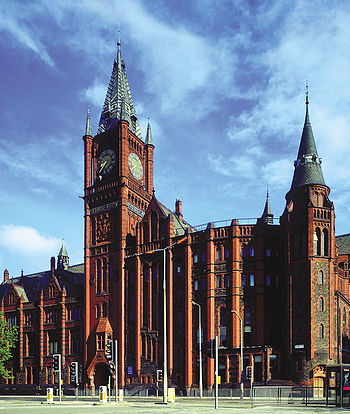 The University of Liverpool was founded in 1881 (as a University college). It is also one of six original “red brick” civic universities. In 1903, it became an independent university with the right to advise its own degrees and was named the University of Liverpool. The university has produced eight Nobel Prize winners, including the first British Nobel Prize in 1902.
The University of Liverpool was founded in 1881 (as a University college). It is also one of six original “red brick” civic universities. In 1903, it became an independent university with the right to advise its own degrees and was named the University of Liverpool. The university has produced eight Nobel Prize winners, including the first British Nobel Prize in 1902.
The current number of students is over 14,000, including 3,200 postgraduate students and 2,800 international students from more than 100 countries (1,200 undergraduate students, 1,600 postgraduate students). Around 1,700 teaching staff are engaged in teaching and scientific research.
Location
Liverpool has been described as having “the most splendid setting of any English city”, a port city located in the northeast of England, with a population of 439,476. Two and a half hours from London or 45 minutes from Manchester Airport by car.
Introduction
The architecture in Liverpool is very unique. Buildings include Liverpool Cathedral, Liverpool Town Hall, St George’s Hall, Great Movie Themes and the Royal Liverpool Philharmonic Orchestra.
Liverpool is home to two Premier League football clubs, Liverpool F.C. and Everton F.C.. Matches between the two clubs are known as the Merseyside derby.
It was also the birthplace of the Beatles. You will meet the “Eternal Beatles” there by visiting “The Beatles Story” museum.
Liverpool has long history and is one of the earliest British cities that Chinese immigrants began living in. It had the first China Town in UK, which is the oldest China Town in Europe. Liverpool’s coastline is very similar to the Shanghai Bund, and because of this it is a twinned city with Shanghai. The University of Liverpool has been accepting Chinese students for years.
University Facilities
The University of Liverpool is well known for its research. It has advanced laboratories, libraries and computer equipment. Its research is famous internationally.
Courses
Liverpool University offers bachelor, master and doctoral degree programmes, including Liberal Arts and Professional Arts, Business, Engineering, Law, Management, Medicine, Science, Social Science and Veterinary Medicine.
Degree programmes require three years for completion. Students from countries whose education system is different from that of the UK’s can take a one-year foundation course in order to link up with the university’s degree programmes.
Master’s courses, including courses with the latest technical seminars for related professions and theory, usually take one academic year to complete. The university offers about 130 Master’s degree programmes.
Exclusive Courses
In 1994, the University of Liverpool founded the Football Research Centre and co-established the Football Industry MBA with the Institute of Public Administration. The course allows students to gain business management skills, and then have in depth study in different aspects of the football industry, such as International Football Affairs, Commercial Football, Football Globalisation, Football and Finance and Football and Law. The football industry has become an important programme at the University of Liverpool.
The University of Liverpool is aware of the historical and cultural value in studying popular music. In 1988, it provided a bachelor’s degree in Pop Music. Two years ago, a master’s degree in Music Industry Study was established, and was the world’s first school to offer a master’s degree in this profession. Students in the pop music college not only do research, but also do their own lyrics, composition, singing and accompaniment. A future star could be born here!
Tuition (2009)
Mathematics, Liberal Arts, Social Sciences, Law: £ 8,700 per year.
Business Studies: £ 9,650 – £ 11,300 per year; MBA: £ 13,500 per year.
Science and Engineering: £11,300 per year.
Medicine, Dentistry: £17,300 per year.
Living Costs
The average cost of living is £6,000 – 6,500 per year
Admission Requirements
Postgraduate: IELTS 6.0 – 6.5.
Undergraduate: IELTS 6.0 – 6.5.
